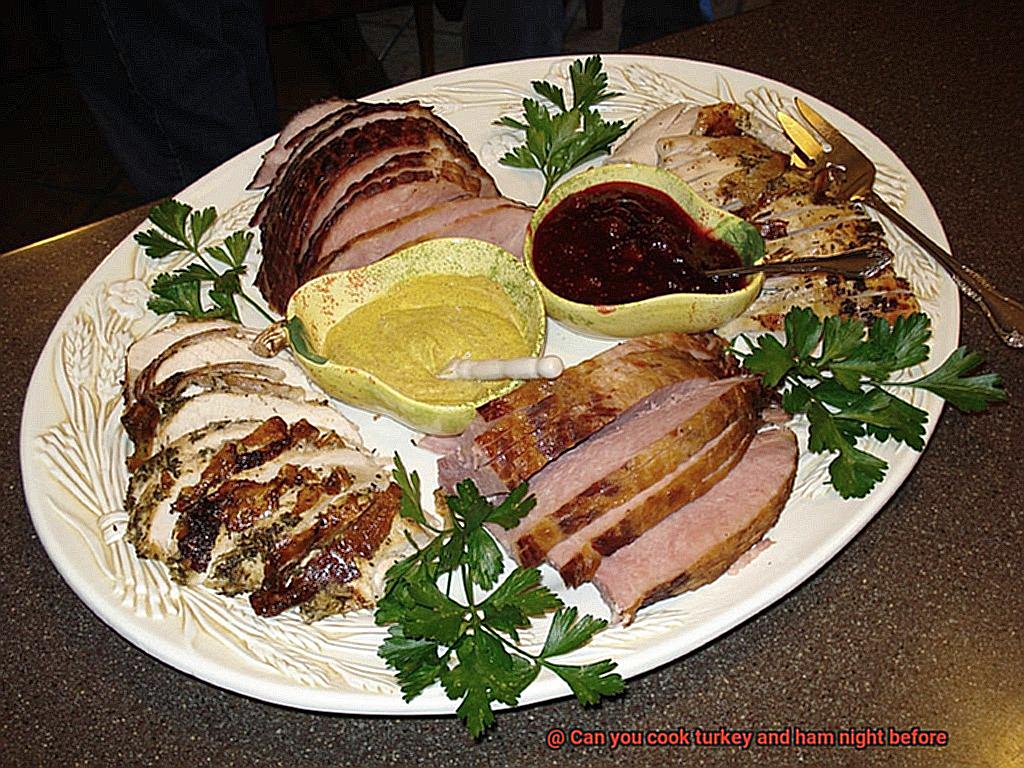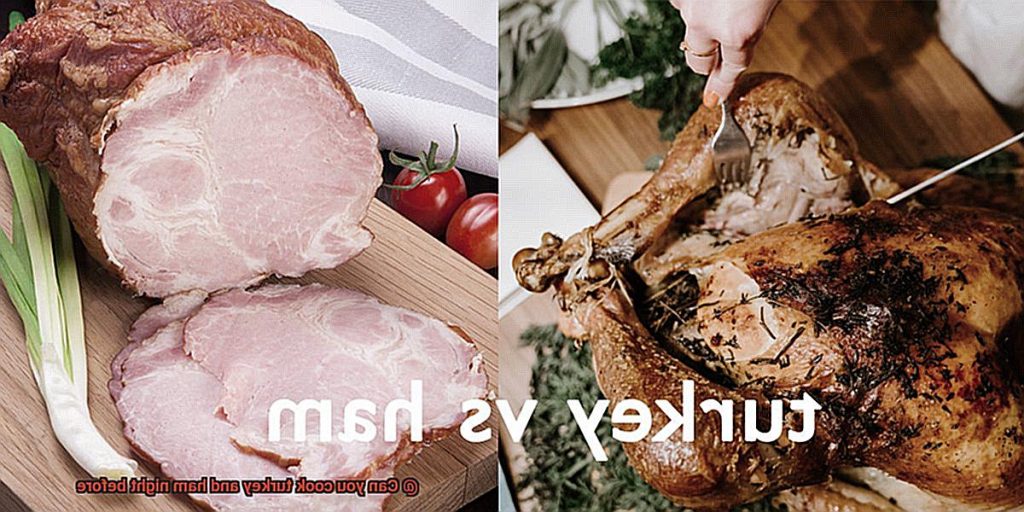The holidays are just around the corner, and if you’re anything like me, you’re already feeling the pressure of planning and prepping for the big feast. Turkey and ham are often the stars of the show, but with so much to do on the day of the celebration, is it possible to cook these dishes ahead of time? The answer is a resounding yes. But before you start prepping, there are some important things to keep in mind.
First up: storage. Properly storing your cooked meats is key to keeping them safe and delicious. This means paying close attention to temperature and moisture levels, and potentially investing in quality storage containers. Next on the list: reheating. No one wants dry, overcooked meat or worse yet, foodborne illness from undercooked meat. Yikes.
But fear not. With a little bit of planning and preparation, cooking your holiday meats the night before can be a game-changer. Not only will it save you time and stress on the day of your celebration, but it can also actually improve the flavor and texture of your turkey or ham.
In this article, we’ll delve into all the benefits (and risks) of cooking these holiday staples ahead of time. We’ll also provide some tips and tricks for ensuring that your meal turns out perfectly – juicy meat included. So sit back, relax (sorta), and let’s get ready to tackle this holiday feast together.
Contents
What is the Difference Between Cooking Turkey and Ham?
If you’re trying to decide between cooking turkey and ham for your holiday meal, it’s essential to understand the key differences between these meats. Turkey is leaner and drier than ham, with less fat content, so it requires careful preparation to prevent it from drying out during cooking. Ham, on the other hand, is a fatty meat that has more natural moisture and fat, making it easier to keep moist and flavorful.
In addition to their differences in fat content, turkey and ham also require different cooking times and temperatures. Turkey is a larger bird and typically cooked at a lower temperature for an extended period to ensure it’s cooked thoroughly. In contrast, ham can be cooked at a higher temperature for a shorter time since it’s already precooked and only needs to be reheated.
If you’re planning to cook turkey or ham the night before your holiday meal, it’s crucial to follow food safety guidelines. Both meats should be cooked until they reach the appropriate internal temperature of 165°F for turkey and 145°F for ham. After cooking, let the meat cool before wrapping it tightly in foil or plastic wrap and refrigerating it overnight. When reheating the meat the next day, make sure it’s warmed throughout.
To prevent your turkey or ham from drying out when refrigerated overnight, wrap them tightly to seal in the moisture. If you’re short on time, ham may be a more convenient option since it requires less cooking time and can be prepared quickly.
Is it Safe to Cook Turkey and Ham the Night Before?
While it may seem like a convenient option, it’s important to take some precautions to ensure that your leftovers are safe to eat.
The first and foremost thing to remember is to cook your turkey and ham to their appropriate internal temperatures. This not only guarantees their safety but also helps retain their scrumptious flavors. According to the USDA, turkey should be cooked to an internal temperature of 165°F (74°C), while ham should reach 145°F (63°C).
Once you’ve cooked your meat to perfection, it’s crucial to cool it down as quickly as possible before storing it in the refrigerator. This prevents bacteria from multiplying and potentially causing food poisoning. So, divide your turkey and ham into separate airtight containers and place them in the fridge immediately.
When it’s time to reheat your leftovers, make sure you do so thoroughly. The USDA recommends reheating leftovers to at least 165°F (74°C) before serving. You can use the oven, stove, or microwave for this purpose.
Here are some more tips to keep in mind:
- Ensure that your fridge temperature is at or below 40°F (4°C) to keep your food fresh and safe.
- Don’t leave your cooked meat out at room temperature for more than two hours before refrigerating it.
- Always use clean utensils and surfaces when handling cooked meat to avoid cross-contamination.
How to Cook a Turkey the Night Before
Cooking a turkey the night before can be a game-changer for your Thanksgiving dinner. With proper preparation, you can serve up a moist and delicious bird without the stress of last-minute cooking. Here are five key steps to follow for a successful turkey dinner:
Thawing the Turkey
Before you start cooking, ensure that your turkey is completely thawed. This can take several days in the refrigerator, so plan ahead and don’t rush this step. A frozen turkey can result in uneven cooking and potential food safety hazards. Once thawed, rinse the turkey under cold water and pat it dry with paper towels.
Seasoning the Turkey
Seasoning your turkey is where you can get creative with flavors. Whether you prefer a classic blend of salt and pepper or something more elaborate, make sure to season both inside and outside of the bird for maximum flavor. A great way to add moisture to the turkey is to brush melted butter or oil on the skin before seasoning.
Cooking the Turkey
There are several methods for cooking a turkey, but the key is to cook it low and slow to avoid drying it out. One option is to roast it in the oven at 325°F for about 13-15 minutes per pound until the internal temperature reaches 165°F. Another option is to use a slow cooker or crockpot on low for 8-10 hours. Regardless of which method you choose, cover the turkey tightly with foil to seal in moisture and prevent it from drying out overnight.
Storing the Turkey
Once your turkey is cooked, let it cool for about an hour before carving it into pieces. Place the pieces of turkey in a large container or baking dish and cover them with broth or gravy to keep them moist. Then, refrigerate the turkey overnight. This will allow all the flavors to meld together and make reheating easier.
Reheating the Turkey
When you’re ready to serve, preheat your oven to 350°F and reheat the turkey for about 30 minutes, or until heated through. You can also reheat the turkey in a slow cooker or on the stovetop. Just make sure to keep it covered to prevent it from drying out. Once reheated, garnish with fresh herbs and serve with your favorite sides.
How to Cook a Ham the Night Before
Cooking a ham the night before can be a great solution, but it’s important to follow proper cooking and storage techniques to ensure a tasty and safe meal. Here are some tips for cooking a ham the night before:
Choose the Right Ham
Before you start cooking your ham, make sure you have the right type for your recipe. There are bone-in or boneless, smoked or unsmoked, and fully cooked or raw hams available. Follow the cooking instructions carefully to ensure you choose the right type of ham and cook it correctly.
Preheat Your Oven
Preheating your oven to the recommended temperature is important as it ensures that your ham cooks evenly and thoroughly. This step is critical to achieving a juicy and flavorful ham.

Prepare the Ham
If you’re using a raw ham, season it with your desired spices and herbs before cooking. You can also inject flavor into the meat with a marinade or glaze. If using a fully cooked ham, brush it with a glaze or sauce for added flavor.
Cook the Ham
Place the prepared ham in a roasting pan, cover with foil, and cook for the recommended amount of time based on weight and type. A meat thermometer is essential for checking if your ham has reached an internal temperature of at least 145°F.
Let It Rest
After cooking, let the ham rest for 10-15 minutes before carving to allow juices to redistribute and make the meat more tender. This step is often overlooked, but it’s crucial for producing a succulent and moist ham.
Store It Properly
Once cooled, wrap the ham tightly in plastic wrap or foil and store it in the refrigerator until ready to serve. This helps to lock in moisture and prevent bacteria growth.
When reheating your ham, there are different methods to achieve optimal results. You can heat it in the oven at 325°F for 10-15 minutes per pound until an internal temperature of 140°F is reached. Alternatively, slice the ham and heat it in a skillet with a small amount of water or broth until heated through.
It’s important to note that if you slice the ham before reheating, it may dry out more quickly, so it’s recommended to keep it unsliced until ready to serve. Additionally, leftover ham should be consumed within 3-4 days and reheated to an internal temperature of 165°F for food safety purposes.
Tips for Storing Cooked Meats Overnight
Cooking a juicy turkey or ham for a special occasion is always a treat. But, did you know that properly storing them overnight can ensure they remain safe and tasty for the next day’s meal? Here are some tips to follow for storing cooked meats overnight:
Cook the Meat Thoroughly
It’s vital to cook the meat to the right temperature before storing it. Undercooked meat can harbor harmful bacteria that can grow and multiply during storage, leading to foodborne illness. To ensure food safety, make sure the internal temperature of the turkey reaches 165°F, and ham reaches 145°F.
Let the Meat Cool Down
Once fully cooked, let the meat cool down before storing it in the refrigerator. This helps reduce bacterial growth by quickly lowering the temperature of the meat. Using shallow containers instead of deep ones will help it cool down faster and more evenly.
Store in Airtight Containers
Air exposure can cause spoilage; that’s why storing cooked meats in airtight containers or sealed plastic bags is crucial. Label your containers with the date and type of meat to keep track of when you cooked it and how long it has been stored.
Set Your Refrigerator Temperature
It’s essential to keep your refrigerator at 40°F or below to slow down bacterial growth and extend meat’s shelf life. If you’re unsure of your fridge’s temperature, use a thermometer to check.
Reheat Thoroughly
When reheating cooked meats, ensure you heat them thoroughly to an internal temperature of 165°F or higher to kill any potential bacteria that may have grown during storage.
The Pros and Cons of Cooking Meat the Night Before
Cooking meat the night before can be a convenient time-saver, but there are pros and cons to consider.
Let’s start with the pros. Pre-cooking your meat can save you time on the day of your event, allowing you to focus on other tasks like preparing delicious side dishes or entertaining your guests. Plus, it can provide peace of mind knowing that your meat is fully cooked and safe to eat.
However, there are also some potential drawbacks. One concern is that your meat may dry out or lose its texture when reheated. This is especially true for lean cuts of meat like turkey breast or ham that are prone to drying out. You don’t want to disappoint your guests with tough, chewy meat.
Another important consideration is food safety. If your meat is not stored properly after cooking, it can become contaminated with harmful bacteria and cause foodborne illness. Proper storage and thorough reheating are key to avoiding this risk.
To ensure your meat stays juicy and flavorful when reheated, consider using a marinade or sauce to add moisture. And if you’re worried about food safety, invest in a meat thermometer to ensure that your meat is heated to the proper temperature before serving.
Alternatives to Cooking Meat the Night before
I am here to share some fantastic alternatives that will make your life easier and your taste buds happier.
One option is to cook the meat a few hours in advance and keep it warm with a warming tray or slow cooker. This method provides greater temperature control, ensuring that the meat remains juicy and tender without drying out.
For those seeking a smoky flavor, consider smoking the meat the day before. This low and slow cooking technique infuses the meat with a delicious smoky flavor that will have your guests coming back for more. Store the smoked meat in an airtight container in the refrigerator until it’s ready to be reheated and served.
Another alternative is to marinate the meat overnight. Marinating enhances the flavor while keeping the meat moist and tender. Mix together your desired marinade ingredients and allow the meat to soak in it overnight in the refrigerator. Come mealtime, remove it from the marinade and cook as desired.
In case none of these options work for you, purchasing pre-cooked turkey or ham from your local grocery store can save you time while still providing a tasty addition to your meal. Just be sure to check the expiration date and follow any reheating instructions provided by the manufacturer.
tAF0Hxwd7dE” >
Conclusion
To sum it up, cooking your turkey and ham the night before can be a real lifesaver when it comes to holiday meal prep. But don’t forget that safety should always come first. Make sure you cook your meats to the right internal temperature and store them properly in the fridge.
If you’re worried about losing texture or flavor, there are plenty of alternatives to consider. You can keep your meat warm with a warming tray or slow cooker, smoke it for an added kick of flavor, marinate it overnight for extra tenderness, or even buy pre-cooked meat from your local grocery store.
With a little bit of planning and preparation, you’ll be able to serve up a delicious feast that will wow your guests without causing you too much stress.






